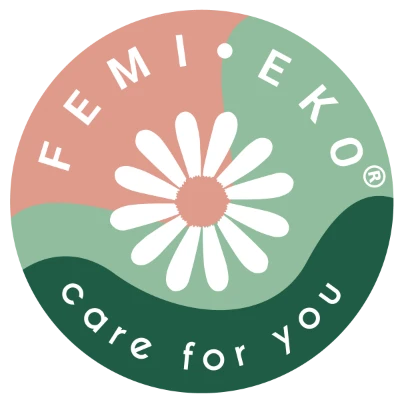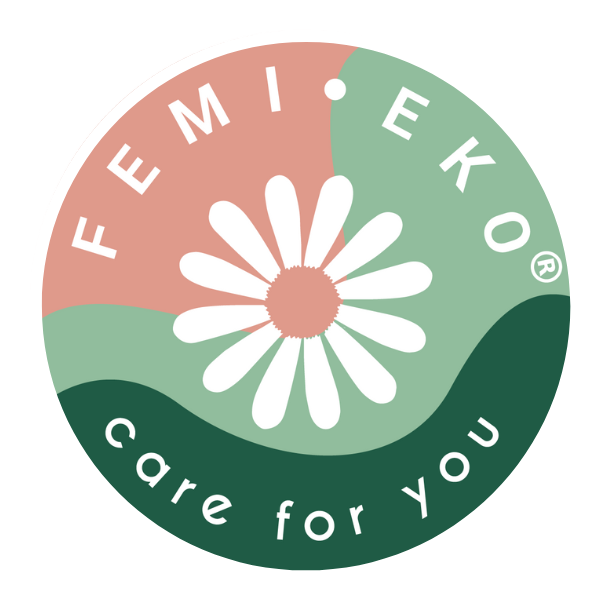FAQ Reusable pads
Why use reusable pads instead of sanitary pads?
Reading this means you are interested in making a change. We hope this will convince you that it is the right decision:
You will prevent thousands of disposable pads from ending up in landfills and thus generate less waste.
You save money by not having to buy pads every single month.
You are less exposed to unhealthy chemicals, treated cotton, bleaches, etc., which are usually used in the manufacture of disposable sanitary napkins.
No chemicals are transferred to your body through sweat, and some women have noticed fewer menstrual cramps after stopping using regular sanitary pads.
Reusable cloth pads are more comfortable and skin-friendly as they do not contain chemicals and are made from hypoallergenic organic cotton and antibacterial hemp.
No annoying sticky residue on your panties from now on.
Long-term investment, as you can use the reusable washable cloth pads for between 2 and 5 years.
Are reusable pads a healthier solution?
Femi.Eko®'s reusable pads made from a lovely soft fabric tend to be more breathable and are less likely to expose your intimate area to harsh and harmful chemicals as some sanitary pads do as these may contain dioxin, acetone , chlorine, pesticides and many other nasty toxins.
Speaking of health, it's important to make sure you change your reusable pads regularly and keep the intimate area clean after each use.
Femi.Eko®'s reusable pads are made from Oeko-Tex fabrics with a blend of hypoallergenic organic cotton and antibacterial hemp without microfibre, which is a more sustainable choice for both your body and the planet.
How sustainable are Femi.Eko® reusable pads made from hemp?
Hemp fabric/fibres offer several advantages, including:
Sustainability: Hemp is a fast-growing and renewable resource that requires minimal water and no pesticides to grow, making it an environmentally friendly choice.
Durability: Hemp fibers are strong and durable, resulting in long-lasting and elastic textiles.
Breathability: Hemp fabric is breathable and moisture wicking, which makes it comfortable to wear, even in different weather conditions.
Antibacterial properties: Hemp has natural antibacterial properties that can help reduce odors and promote hygiene.
Environmentally friendly processing: The production of hemp fabric typically involves fewer chemicals and toxins compared to other textiles, further reducing its environmental impact.
Biodegradability: Hemp textiles are biodegradable, meaning they break down naturally over time, reducing waste.
Do reusable pads smell?
The good news is that Femi.Eko® reusable pads tend to stay fresher than disposable pads. This is because the organic cotton and hemp have a high breathability, so that the moisture can evaporate quickly. Less moisture means less bacteria that produce nasty smells. If you find that a reusable pad smells, it is not the pad's fault and we recommend that you talk to your doctor. To protect against odours, you can soak your washable pads in vinegar or baking soda to help remove odours, and you can wash the reusable pads at 60 degrees.
Will reusable pads leak?
Femi.Eko®'s washable pads are produced to be highly absorbent and you will not experience leaks if used correctly. The reusable pads have wings that bend around the bottom of the panty to keep the sides of the panty safe and dry. Our reusable pads have a waterproof backing for added protection. Just like disposable pads, you must of course change the cloth pads before they become completely saturated. After using reusable pads for a short time, you know when to change them. Tip! When you go to the toilet, you can use a piece of toilet paper to absorb some of the blood content from the cloth pad, so you can be sure that it does not become too saturated.
Are Femi.Eko® pads comfortable?
Not only are the reusable pads comfortable, but the breathability keeps you feeling dry and fresh. The reusable pads are very soft because of the organic cotton and hemp that feel like they never get wet, which makes a big difference compared to disposable pads. The breathability of the hemp protects against bacteria formation and therefore you can experience less odor and irritation. Some users say the breathability makes them much cooler to wear than disposable pads that contain plastic parts that retain heat.
Are reusable pads suitable for heavy periods?
Yes, in fact Femi.Eko®'s reusable pads can be extremely absorbent. We recommend that you choose size M, then you will be protected and feel safe during the day, but also at night. In addition, the reusable cloth pads feel less wet than normal pads, so you feel comfortable even when you bleed profusely. For daily use we recommend size S and as panty liners for everyday use size XS .
How do I wash reusable pads?
Blood is a strong stain, so always remember to use cold water first, whether you're washing a sanitary napkin or period panties or just a stain from the sheets. Soak pads in cold water before washing, or run cold water on the blood stain while you rub it with your hands (especially if there is clotted blood on the pad). Afterwards, you just have to wash the cloth bandage normally, at 40 degrees, in the washing machine or by hand. When your period is over, disinfect the reusable pads by washing them at 60 degrees.
If you choose to wash cloth napkins by hand, you should probably soak them first to make them easier to wash. Rub the used cloth pad with warm water and hypoallergenic detergent, then rinse the pad in cold water until the water runs clear.
We recommend avoiding fabric softener, as it can make the textiles less absorbent. It is also not recommended to bleach cloth napkins, as this can break down the material and interfere with absorbency, but can also be transferred to your skin.
You can either air dry reusable pads by hanging them up, or by using the tumble dryer, but don't use high heat or tumble dry at full power. Like all things that air dry, cloth pads can feel a little stiff at first.
Sunlight can kill any bacteria and make stains disappear, but the sun can also bleach the colors of your cloth bindings or damage waterproof backing materials, especially if exposed to sunlight or high heat over a long period of time.
Always stretch the cloth bandage after washing so that it regains its original shape.
Cloth bandages must not be ironed! Do not use perfume or chemicals, as they are hormone disruptors and affect the pH value in the vagina.
Is it better to use organic cotton sanitary pads?
It is always better for health to buy organic, but the problem of waste from disposable pads is still a fact we have to consider when we think about the environment. Organic washable pads from Femi.Eko® are made from organic cotton that is grown without pesticides or herbicides, which means that fewer of these chemicals enter your body. It also means less pollution of the soil and less damage to the environment. In addition, it also means less exposure to toxins for the people who work on the farms where the cotton grows. In addition, our patent-pending technology has combined organic cotton with the fantastic benefits of fabric with hemp fibers, making our reusable pads naturally antibacterial, moisture-resistant and suitable for washing at 60 degrees.
How often should I change my reusable pad?
You should change Femi.Eko®'s reusable pads according to your needs. The more you get used to it, the better you know when saturation is at its peak. However, we do not recommend that you use a reusable pad for more than 12 hours at a time.
How much money can I expect to save by switching to reusable pads?
Women experience menstruation, on average, for about 35 years of their lifetime. That adds up to a lot of money spent on menstrual products over the years. By switching to reusable pads and sustainable options like menstrual cups, discs, or panties, you can significantly reduce these costs.
Here’s the calculation:
35 years × 12 periods/year × 5 days/period = 2,100 menstrual days
That’s approximately 5 years and 8 months of uninterrupted menstrual days—crazy, right?
If you use 4 disposable pads/day for 2,100 days, that equals 8,400 disposable pads over your lifetime.
At an average cost of €4.50 per pack for disposables, you would spend about €5,065 during your lifetime.
Now, if you switch to reusable cloth pads, let’s say you use 6 pads per cycle and replace them every few years. Over 35 years, you’d need about 42 reusable pads in total. With each pad costing around €75, your total cost for reusable pads would be approximately €422.
The savings? €5,065 vs. €422—a huge difference, both for your wallet and the planet!
How many reusable pads should I use?
It depends on how much you bleed and whether you also use other menstrual products such as e.g. Femi.Eko®'s menstrual cups or our menstrual disc , or whether you switch between using Femi.Eko®'s reusable pads and menstrual panties .
Most women find that 5 to 10 reusable pads are enough to cover their cycle.
To figure out how many reusable pads you might need, start by calculating the number of disposable pads you typically use during your period, then divide that by 3. This way, you’ll have the perfect amount to stay comfortable and confident throughout your cycle!
Can teenagers use Femi.Eko® reusable pads?
Absolutely! Sustainable habits should start early, and we encourage teenagers to make eco-friendly choices by opting for products that reshape the way we consume. Beginning with reusable, washable pads helps young girls and teens manage their cycle confidently—without the high costs of disposable products.
Can I use reusable pads for incontinence or after birth?
Femi.Eko®'s reusable pads are an ideal solution for light incontinence, offering comfort and breathability for those who need daily protection. Unlike disposable pads, which can increase the risk of fungal and bacterial infections, or cause irritation and chafing, our reusable pads provide a gentler, more comfortable alternative. After childbirth, many women also opt for our soft, reusable organic pads, as they are a natural, skin-friendly choice that promotes postpartum healing and supports intimate care.





